High Calorie Foods For Weight Gain: 22 Calorie-Packed Picks
A list of the best foods for a diet to complement your muscle and weight gain journey.
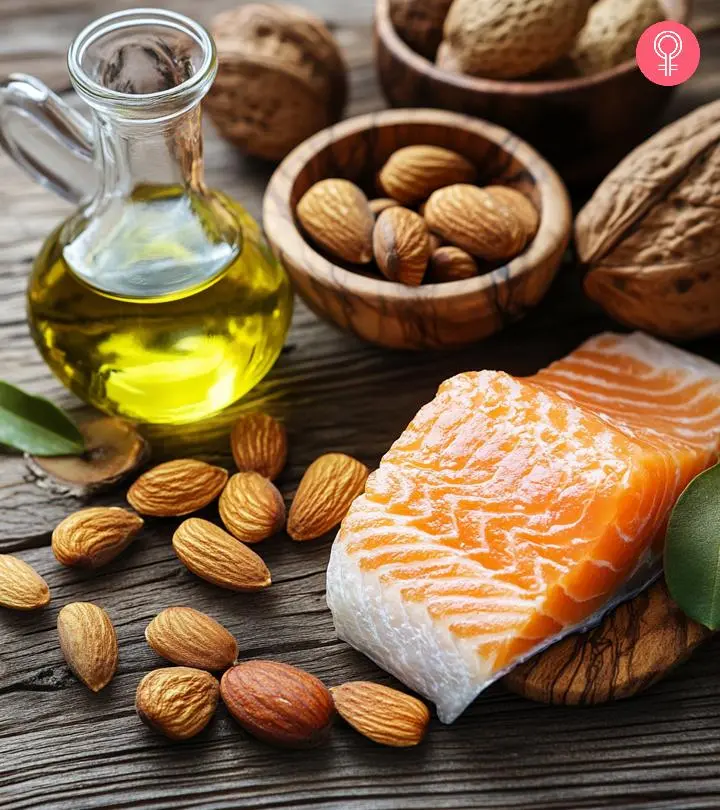
Image: Midjourney/ StyleCraze Design Team
If you are looking for some high-calorie foods for weight gain, you have landed on the right page. Gaining weight can be just as challenging as losing it, especially for individuals with fast metabolisms or specific dietary restrictions. Sara Chatfield, Registered Dietitian, says, “Gaining weight can be challenging if you have a fast metabolism or if you have a restricted diet or poor appetite.”But, simply adding a few high-calorie foods can help you gain weight, to build muscle mass. However, you should aim for consistent strength training to prevent increasing fat mass. Including these foods that help you gain weight in your diet also helps boost your stamina and energy levels.
Here’s a list of the top 21 weight-gaining foods that you can include in your diet. Check it out!
In This Article
22 High-Calorie Foods For Weight Gain
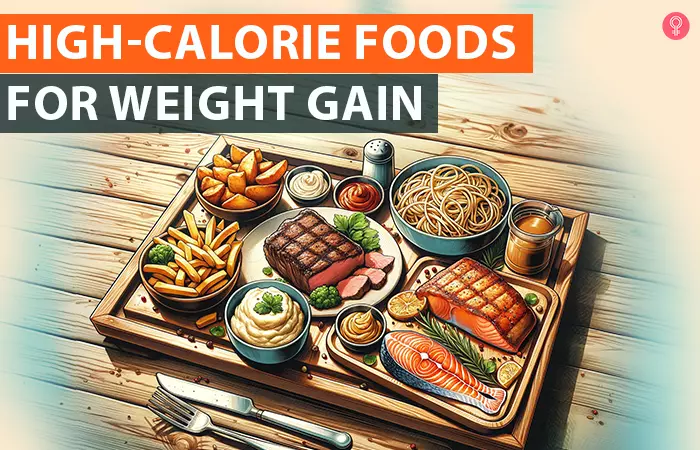
Your body needs a specific amount of calories every day to carry out essential functions like physical activity and maintaining its current weight. When you eat more calories than what’s needed, the extra energy is not burned off immediately. Instead, your body stores it for future use (1). At first, the surplus calories are converted into glycogen, which is stored in your muscles and liver. However, glycogen storage capacity is limited, and once those stores are full, any additional calories are converted into fat (2). This fat is stored in your body, leading to weight gain over time. In simple terms, consistently eating more calories than your body burns is what causes you to gain weight. If your goal is to gain weight, being in a calorie surplus is essential.
Alicia Chacha Miller, MS, RD, LDN, adds, “For healthy weight gain, a well-balanced macronutrient ratio includes a higher intake of complex carbohydrates, quality proteins, and nutrient-dense fats. A general guideline is around 50-60% carbohydrates, 20-30% healthy fats, and 15-25% protein, depending on individual needs. To increase calorie intake without relying solely on ultra-processed foods—often high in calories but lower in nutrient density—focus on nutrient-dense, higher-fat whole foods like avocado, nuts, and seeds. Adding calorie-rich extras, such as nut butters, olive oil, or full-fat dairy, to meals and snacks is an easy way to boost energy intake while maintaining nutritional quality.”
Jesse Feder, Clinical Dietitian, says, “The highest calorie food by volume is oil. This includes avocado oil, vegetable oil, canola oil, grape seed oil, etc. Other high-calorie foods include red meats, full fat dairy, avocados, and nut butters. High calorie snacks include nut butters, cheese, trail mix/nuts, granola, and milk or chocolate milk. Fruits that are high in calories include avocados, figs, dates, and coconut.” Here are some food supplements for weight gain!

High-Calorie Vegetarian Foods For Weight Gain
High-calorie foods do not always have to be processed. Katie Hlucny, MS, RDN, mentions, “ To effectively increase calorie intake without relying on processed foods, try incorporating energy-dense, whole-food options. This includes foods like avocado, nut butters, seeds, oils, and full-fat dairy. These are rich in healthy fats and pack a calorie punch without requiring large portions. For protein, options like eggs, meats, fatty fish, beans, and lentils work well. Pair them with complex carbs such as sweet potatoes, quinoa, or other whole grains to fuel your body and support muscle growth.” Some of these options are discussed below.”
Also, all the high calorie foods for weight gain mentioned in this list, except dairy, cheese, and yogurt, are also suitable for vegans. Check it out!
1. Peanut Butter

Peanut butter is considered one of the best foods to gain weight. It is packed with healthy fats and protein, giving you a lot of calories in a small amount. Two tablespoons of peanut butter contain 191 calories, 7 g of protein, 16 g of fat, and 7 g of carbohydrates (3). Peanuts are also rich in protein and contain all the 20 amino acids that strengthen the immune system and build stamina (4).
However, a study published in The American Journal of Clinical Nutrition offers different views when it comes to weight gain with nut butter. It suggests that having any type of nut butter every day as a snack or with slices of fruits does not lead to significant weight gain. But, its regular consumption can offer you better weight control. This may be because the healthy fats and protein in peanut butter can help keep you feeling full and satisfied, potentially reducing the urge to overeat or binge on less nutritious foods (5). That said, peanut butter can still be an excellent addition to a weight-gain plan if used strategically. For instance, you can include it in high-calorie smoothies, spread it on whole-grain bread, or pair it with calorie-dense foods like bananas or oatmeal.
Note: It is important to note that some commercial peanut butter brands contain added sugars and hydrogenated oils, which may not be ideal for health. Opt for natural peanut butter with no added ingredients to maximize the health benefits.
 Quick Tip
Quick Tip2. Full-Fat Dairy
Full-fat milk is the best, whether you are trying to lose or gain weight. When you are trying to gain weight, you benefit from the healthy fats, minerals, and protein present in whole or full-fat milk. Plus, the high calories of full-fat dairy can help increase your overall caloric intake, aiding in weight gain.
One cup (244 g) of whole or full-fat milk gives 149 calories of energy, 8 g of protein, and 8 g of fat (6).
Full-fat milk with a protein supplement or whey protein powder and fruits (like banana or berries) makes for the best high-calorie smoothie to gain weight, build muscle mass, and improve muscle recovery (7), (8).
Lucas, a bodybuilder and blogger, decided to consume 200 grams of protein daily for 30 days. He said, “I started to notice some positive changes. My skin was looking tighter and my muscles felt denser. I also felt an increase in strength and energy (i).”
Thus, these high protein foods for weight gain are also the best calorie foods that you can easily consume.
A study conducted at McMaster University (Canada) found that milk-based proteins are better for the development of muscle mass than soy-based proteins. It suggested that full-fat milk offers a slower, longer-lasting release of amino acids, which seems to give muscles a bigger benefit compared to soy milk’s quicker, shorter boost (9). So, if you wish to bulk your muscles, incorporating milk-based proteins into your diet may be a more effective strategy. You can add milk to high-calorie smoothies or in oatmeal, cereals, or even drink it plain, as a quick, protein-rich snack.
3. Banana

Bananas are loaded with dietary fiber, potassium, protein, vitamin A, vitamin C, folate, and healthy fats. The calorie-dense fruit is also a great source of natural sugars and carbohydrates, making it a good choice for those looking to increase their calorie intake for weight gain (10).
One medium-sized (118 g) banana provides 105 calories of energy and 27 g of carbohydrates. A study conducted on male cyclists suggests that the ingestion of banana helps improve energy levels (10).
You can have a banana with a cup of milk and a few nuts for a power-packed breakfast or make a smoothie with the same ingredients and have it before working out. Here are more breakfast ideas to add to your weight-gain foods list.
4. Potatoes And Other Starches
Adding potatoes to any dish is a cost-effective way to add more calories to your diet. 100 g of potatoes contain 74 calories of energy, 2.03 g of protein, and 17.6 g of carbohydrates (11). Potatoes and other starchy vegetables are rich in carbohydrates and a must for your healthy high calorie foods list. Studies show that the intake of carbohydrate-rich foods along with protein supplements helps build muscle mass (12).
Consume boiled, baked, or roasted potatoes to get the best out of its nutrients.
 Quick Tip
Quick Tip5. Rice

Rice is a cost-effective way to add more calories to your plate.
100 g of white rice provides 130 calories of energy and 28 g of carbs with a very little amount of fat (13).
When you are in a hurry, just microwave a bowl of rice with some curry. It adds bulk to your high-calorie diet and is quite satiating. (14).
6. Homemade Protein Smoothies
Protein smoothies are loaded with nutrition and do not contain artificial sweeteners and taste enhancers. You can have them for breakfast, lunch, dinner, or as a pre– or post-workout meal.
Studies have found that taking protein supplements with resistance training helps build muscle mass and, thus, gain weight (15).
Here are a few quick homemade protein shake ideas:
- Peanut Butter Protein Shake – 2 tablespoons peanut butter, 1 cup full-fat milk, and 1 banana.
- Chocolate And Apple Protein Shake – 2 scoops chocolate protein powder, 1 cup soy milk/almond milk, and 1 apple.
- Banana And Almond Protein Shake – 1 large banana, ½ cup yogurt, ½ cup milk, and 2 tablespoons almond powder.
7. Full-Fat Cheese

Cheese is a calorie-rich milk product that is a staple all over the world in different forms. 100 g of full-fat cream cheese contains 343 calories of energy, 5.79 g of protein, and 33.5 g of fat (16). This makes cheese a high-calorie foods for weight gain. Cheddar cheese is loaded with protein and calcium (17). The same is true for feta, mozzarella, ricotta, parmesan, and cottage cheese. Here is a quick glance at the nutrition information of these cheese varieties:
- Cheddar: 100 g of cheddar contains 403 calories of energy, 22.9 g of protein, and 33.3 g of fat (17).
- Mozzarella: 100 g of mozzarella contains 298 calories of energy, 23.7 g of protein, and 20.4 g of fat (18).
- Ricotta: 100 g of ricotta contains 158 calories of energy, 7.81 g of protein, and 11 g of fat (19).
- Parmesan: 100 g of parmesan contains 420 calories of energy, 29.6 g of protein, and 28 g of fat (20).
- Cottage Cheese: 100 g of full-fat cottage cheese contains 105 calories of energy, 11.6 g of protein, and 4.22 g of fat (21).
Thus, having cheese can help you gain lean muscle and strengthen your bones. You can sprinkle grated parmesan or cheddar on pasta, salads, or baked dishes. Spread cream cheese on whole-grain crackers, toast, or use it as a dip for vegetables. You may also incorporate ricotta or cottage cheese into sandwiches and pancakes.
8. Dry Fruits And Berries
Dried fruits like dried coconut and raisins are loaded with calories, carbohydrates, and healthy fats (22). Consume a handful of dried fruits as a pre- or post-workout snack or add them to smoothies and breakfast bowls.
Dates are a great satiating and instant energy-giving food. One pitted date (24 g) provides 67 kcal of energy and 18 g of carbs with vitamins and minerals (23).
Fresh dates are loaded with simple sugar, which replenishes energy and revitalizes the body (24).
Eat 3-4 dates when you are hungry or as a pre-workout fruit to boost your energy levels during a workout. You can also pair dates with nut butter for a balanced snack, as this combination ensures a healthy balance of natural sugars with protein and healthy fats. Alternatively, chop them and sprinkle them on oatmeal, yogurt, or salads.
You can also include cranberries, blueberries, raspberries and strawberries in your diet as they have several nutrients and phytochemicals. They can improve your blood sugar levels, cholesterol levels, and blood pressure. Thus, they may help in preventing and managing diabetes (25). Though there is no direct study that suggests berries aid gain weight, they may help you in doing so without increasing metabolic syndromei A group of conditions that increase the risk of heart attack, stroke, diabetes, and other heart diseases. . Add them to smoothies, yogurt, or breakfast bowls for a nutrient-dense meal. You can also use them as toppings for oatmeal or cereal.
9. Pasta And Wheat Products

Whole wheat pasta can also help you gain weight. Whole wheat-based products like it are rich in carbohydrates, providing a high amount of calories in a small serving. Therefore, these are great for adding bulk and energy to your diet without feeling overly full. A hundred-gram serving of whole wheat macaroni pasta contains 357 calories, 10.71 g of protein, and 75 g of carbohydrates (26).
Make a delicious protein-rich pasta using chicken/mushroom/soy chunks. Add some red or white sauce, toss in some veggies and Italian herbs, and you are good to go.
10. Avocado
Avocado is a rich source of energy. Thus, it helps you gain weight when combined with proper foods. 100 g of avocado offers energy-dense 160 calories of energy and 15 g of fat (27).
Have an avocado smoothie or sliced avocado on whole wheat bread for breakfast. You can also make guacamole and have it with your meals.
11. Mango
Mangoes are not only delicious and sweet but also high in calories and packed with dietary fiber, fruit sugar, vitamins, and minerals. 100 g of raw, peeled mango contains 78 calories of energy and 17.4 g of carbs (28). In addition to their weight-gain benefits, mangoes also have anticancer, anti-inflammatory, and antioxidant properties and can be added to smoothies, breakfast bowls, and protein shakes to gain weight (29).
12. Tahini
Tahini is a sesame seed paste that is popularly used in Mediterranean foods like hummus and baba ganoush. A tablespoon (15 g) of tahini contains 88.8 calories of energy and 7.95 g of fat (30). This makes it a great calorie-rich option you can add to your weight-gain diet.
Apart from the weight-gain benefits, scientists have also found that sesame seeds are loaded with antioxidants and healthy fats that have antihypertensivei A property that helps lower blood pressure levels to the standard range, preventing stroke and other diseases. properties. The lignans in sesame seeds also have anti-inflammatory and immunity-strengthening abilities (31).
Add 2-3 tablespoons of tahini to your salad/mashed potatoes/barbeque and have a delicious meal that will also help you gain weight healthily.
13. Full-Fat Yogurt
Like full-fat milk, full-fat yogurt is helpful when it comes to weight gain as it is high in calories. A 100-gram serving of full-fat yogurt contains 82 calories, 5.29 g fat, 5.88 g protein, and 3.53 g carbs (32).
It is loaded with good gut bacteria, calcium, and milk protein that help improve your immunity, strengthen your bones, and offer the benefits of consuming good-quality dairy fat (33).
Consume 1-2 small bowls of yogurt per day. You can increase the amount if your body can tolerate it. Add it to salad dressings, smoothies, and shakes.
14. Legumes
Legumes like lentils, beans, and peas are moderate in calories but excellent sources of plant-based protein. This is especially beneficial if you are a vegan or vegetarian. Apart from helping you build lean muscle mass for bulking, legumes may also help manage blood pressure and cholesterol levels (34). Different legume varieties may have different nutritional values. For instance, 100 g of black beans have 24.4 g of protein and 1.45 g of fat, while kidney beans have 25.9 g of protein and 1.31 g of fat (35) (36). You can consume them boiled or in curries and stews.
Have mung bean sprouts for breakfast or consume Bengal gram salad or lentil soup.
15. Whole Grain Cereal Bars
Whole grain cereal bars are high calorie foods that can be enjoyed both before and after a workout.
The nuts and cereals found in these bars provide instant energy, and the calories in them help increase weight. The total nutrients in these bars depend on their ingredients or the brand.
You can also make homemade cereal bars by mixing dry fruits with honey or maple syrup. Have them as a snack or post-workout nutrition.
16. Dark Chocolate
Dark chocolate is a high-calorie bittersweet delight. It is a rich source of antioxidants, making it a healthy option to support weight gain, especially when had in moderation. A bar of 70-85% dark chocolate contains around 604 calories and 43 g fat (37).
You can add dark chocolate to your smoothies, homemade protein shakes, peanut butter sandwiches, a glass of milk, or biscuit sandwiches. Get creative and use this ultimate soul-comforting food to gain a few extra pounds.
17. Hummus
Hummus is made with boiled chickpeas, which are protein-dense and high in fat content. 100 g of hummus contains 237 kcal of energy along with 8 g of protein and 18 g of fat (38).
Hummus can be taken as a high-calorie snack for weight gain when combined with baked chips, nachos, or sautéed veggie sticks.
18. Trail Mix And Other Types Of Nuts
Trail mix is a mixture of nuts with seeds with some dehydrated fruits. It is loaded with sugar and makes for a nutritious calorie rich food item for gaining weight. You can satisfy your sweet craving by having some trail mix. It can also be an excellent pre-workout snack to maintain energy levels.
19. Olive Oil
Olive oil is calorie-dense and primarily made up of triglycerides with a combination of monounsaturated, saturated, and polyunsaturated fatty acids. It is a healthier alternative to regular cooking oils due to its rich composition of healthy fats, particularly monounsaturated fats (MUFAs). Research has shown that an increased intake of MUFAs can contribute to weight gain with significant consumption (39). Health experts recommend a daily olive oil intake of around 30 grams or 2 tablespoons to enjoy its benefits (40).
Weight management is fundamentally tied to the balance between calorie intake and expenditure. Consuming more calories than you burn is known to result in weight gain (41). Therefore, even with healthy fats like olive oil, portion control is essential.
High-Calorie Non-Vegetarian Foods For Weight Gain
If you are also looking for some non-vegetarian high-calorie foods for weight gain, here are some great options:
20. Meat With Marbling And With Skin
Animal protein is among the best sources of protein and is also one of the best high calorie foods for weight gain. Meat that is marbled with fat and still has its skin is one of the best choices if you want to gain weight without affecting your health. This type of meat plays an important role in a nutritious diet as it contains beneficial fatty acids. It contains more oleic acidi Odorless and colorless fatty acid found in plants and animals that has a beneficial effect on autoimmune and inflammatory diseases. and less stearic acidi A type of fatty acid found in plants and animals that helps regulate energy metabolism in fat tissue. , which has a positive effect on your health (42). Pair this meat with rice and salad for a balanced meal.
As per another study, the high oleic acidi Odorless and colorless fatty acid found in plants and animals that has a beneficial effect on autoimmune and inflammatory diseases. content in beef may be able to reduce the risk of cardiovascular diseases. Since highly marbled meat (like Wagyu and Hanwoo beef) does not increase LDL cholesterol, you can add it to your diet list under foods to gain weight (43).
21. Salmon And Oily Fish
Salmon and other oily fish are good sources of protein, which helps increase muscle mass and aid weight gain. 100 g of salmon provides 142 kcal of energy along with 20 g of protein and 6 g of fat (44).
A study conducted in Korea found that consuming fish with vegetables can help improve muscle mass (45). Therefore, consume 1-2 pieces of fish per day with leafy greens and nuts to gain weight or lean muscle fast. Include a salmon or oily fish steak in your lunch or dinner along with hot rice to make it more palatable as all these are foods that make you gain weight.
22. Chicken Thigh With Skin
If you are looking for a high-calorie food for weight gain, try chicken thighs instead of the breast. Chicken thighs are loaded with protein, vitamins, and minerals. A 100-gram serving of it contains 149 calories, 18.6 g of protein, and 7.92 g of fat (46). Chicken skin is also naturally high in collagen, which is beneficial for the skin, hair, and nails (47)
Consume leafy greens and whole grains (quinoa or rice) along with your chicken thigh meal. Do not go overboard, as chicken thighs contain a high amount of saturated fats.
Note: When trying to gain weight by consuming high-calorie foods, it is important to consider potential health risks, including impacts on cholesterol and blood sugar levels. Foods high in unhealthy fats, like trans and saturated fats, can elevate LDL (bad) cholesterol levels and increase the risk of heart disease (48). Similarly, consuming too many sugary or processed foods can cause spikes in blood sugar, potentially leading to insulin resistance or type 2 diabetes over time (49). Therefore, to gain weight healthily, focus on nutrient-dense, high-calorie foods like the ones mentioned above. Consulting a healthcare provider or dietitian can also help create a balanced plan tailored to individual health needs and goals.
With a proper meal plan, gaining weight can become much easier and more manageable. Here is a simple example for you.
Key Takeaways
- Peanut butter, full-fat milk, banana, potato, rice, oily fish, and cheese are high-calorie foods that help you gain weight.
- Homemade protein smoothies are packed with nutrition and contain no artificial sweeteners. So, you can have it as a workout meal.
- Along with these foods, adding resistance and strength training will also help gain lean muscles.
Meal Planning For Weight Gain
Here is a simple meal plan for weight gain based on the high-calorie foods discussed above:
Breakfast:
- 2 slices of whole grain toast with 2 tablespoons of peanut butter.
- 1 medium banana.
- 1 glass of full-fat milk or a smoothie made with 1 cup of full-fat milk, 1 tablespoon of peanut butter, and 1 medium banana.
Lunch:
- 1 grilled chicken thigh with skin (150-200g).
- 1 cup of roasted potatoes (150g).
- 1 cup of leafy greens (like spinach or kale).
- 1 small bowl of full-fat yogurt (150g) topped with 2 tablespoons of mixed nuts and dried fruits.
Snacks:
- A handful of trail mix (about 30-40g).
- 2-3 squares of dark chocolate.
- 1 whole grain cereal bar.
Dinner:
- 1 serving of salmon or oily fish (150-200g).
- 1 cup of steamed rice (150g).
- 1 cup of sautéed vegetables (like carrots, broccoli, or zucchini).
- A side of hummus (2-3 tablespoons) with whole grain bread or veggie sticks.
This meal plan provides well-balanced, high-calorie options for effective weight gain. You can easily customize it as per your preferences. Here are some additional meal-planning tips that will help you when you are trying to gain weight:
- Have 5–6 smaller meals daily instead of 3 large ones to make eating more manageable. Katie Hlucny adds, “ Aim to eat 3 meals and 3 snacks per day. Experiment with the timing of your meals and snacks to maximize when you have a larger appetite. Carry energy-dense snacks like nuts, dried fruit, full-fat Greek yogurt, cheesesticks, or smoothies with you on the go.”
- If you find eating more a bit overwhelming, start with small portions and gradually add more food.
- Opt for smoothies, shakes, or fortified drinks as a quicker option to consume more calories. Katie also shares, “Sneak in extra calories by enhancing meals with calorie-rich additions. For example, blend nut butter into smoothies, drizzle olive oil over roasted veggies, or sprinkle chia or hemp seeds on yogurt.
- Prepare calorie-dense meals like casseroles, stews, or curries in bulk. They are easier to reheat and can be stored easily.
- You may also freeze individual portions for convenience.
- Drink water between meals rather than during them to avoid feeling too full for food.
Infographic: Tips For Gaining Weight The Healthy Way
If you want to gain some weight, then doing it the healthy way is very important. From genetics to underlying medical conditions, there are several reasons for being underweight. But, with some effective tips and the right diet, you can achieve a healthy weight. Click on the infographic below to learn some tips for gaining weight.
Some thing wrong with infographic shortcode. please verify shortcode syntax
Conclusion
Gaining weight may be difficult, but it is not impossible. Incorporating high-calorie foods into your diet is essential for weight gain and bulking. Opting for high-fat, high-carb, and nutrient-dense options can provide the necessary energy and nutrients for muscle-building and mass gain. Consume the high-calorie foods for weight gain mentioned in this list, add resistance training or strength training to your workout routine, and remain stress-free. Choosing the right foods and following a balanced diet, along with regular strength training, can help boost muscle growth and improve overall health. You will soon start gaining lean muscle and the right amount of fat. Take care!
Frequently Asked Questions
How can I eat 4000 calories a day?
If you want to consume 4000 calories a day, it is advisable to include healthy fats and healthy calorie-laden foods like avocado, clarified butter, and full-fat dairy. Try avoiding any junk or processed foods. You also may increase intake of fresh fruits and vegetables and go for lean meat as well.
How many calories do I need to gain 5 kg?
You gain about 1 kilo a week for every 1000 calories added. Hence, you may need to add 1000 calories extra per week to gain 5 kilos in a period of 5 to 6 weeks.
Are eggs good for weight gain?
Yes, eggs are a good choice for weight gain. They are packed with protein and can be easily incorporated into the diet.
Do oats with milk increase weight?
Yes, oats with milk can help with weight gain. However, ensure you mix oats with full-fat milk.
How many calories do you burn sleeping?
One will burn approximately 50 calories per hour while sleeping. However, this count can vary from person to person.
How to gain weight?
You need to follow a strict weight gain diet plan for increasing your weight. First, eat more calories. Specifically, you should aim for an extra 300-500 calories per day for slow weight gain or 700-1000 calories per day for faster results. Focus on eating nutrient-dense foods like whole grains, potatoes, eggs, and dairy products, and try to eat frequently throughout the day. Exercise is also important, especially strength training. Finally, you can try drinking smoothies and shakes made with high-calorie, nutritious ingredients or eating energy-dense foods like nuts and seeds.
What food makes you gain weight the fastest?
To put on some extra pounds, you can add certain weight gaining foods to your diet, such as red meat, oily fish, beans, nuts, whole milk, eggs, and avocados. Weight gain breakfasts include foods rich in calories. Don’t forget to include cheeses, yogurt, and whole-grain products as well. If you are still wondering what to eat to gain weight, foods like potatoes, dried fruits, oils, and butter can also help
Ready to pack on some healthy pounds? Discover the top 33 high calorie foods that can help you gain weight effectively. You could also do some easy exercise to gain weight. Watch now and start your journey towards a healthier you!
Personal Experience: Source
StyleCraze's articles are interwoven with authentic personal narratives that provide depth and resonance to our content. Below are the sources of the personal accounts referenced in this article.
i. I Ate 200g of PROTEIN Every Day – For 30 Days!https://www.youtube.com/watch?v=SWt0PzKozYo
References
Articles on StyleCraze are backed by verified information from peer-reviewed and academic research papers, reputed organizations, research institutions, and medical associations to ensure accuracy and relevance. Read our editorial policy to learn more.
- Eva V. Osilla; Anthony O. Safadi; Sandeep Sharma. “Calories.” StatPearls Publishing; 2025 Jan.
https://www.ncbi.nlm.nih.gov/sites/books/NBK499909/ - UK J Acheson 1, Y Schutz, T Bessard, K Anantharaman, J P Flatt, E Jéquier. “Glycogen storage capacity and de novo lipogenesis during massive carbohydrate overfeeding in man.” US National Library of Medicine.
https://pubmed.ncbi.nlm.nih.gov/3165600/ - US Department of Agriculture, Agricultural Research Service. “Nutritive value of peanut butter, smooth style, without salt.”
https://fdc.nal.usda.gov/fdc-app.html#/food-details/172470/nutrients - Arya, Shalini S., Akshata R. Salve, and S. Chauhan. “Peanuts as functional food: a review.” Journal of food science and technology 53.1 (2016): 31-41.
https://www.ncbi.nlm.nih.gov/pmc/articles/PMC4711439/ - Bes-Rastrollo, Maira, et al. “Prospective study of nut consumption, long-term weight change, and obesity risk in women.” The American journal of clinical nutrition 89.6 (2009): 1913-1919.
https://www.ncbi.nlm.nih.gov/pmc/articles/PMC2683001/ - US Department of Agriculture, Agricultural Research Service. “Nutritive value of milk, whole, 3.25% milkfat, with added vitamin D.”
https://fdc.nal.usda.gov/food-details/746782/nutrients - Josse, Andrea R., et al. “Body composition and strength changes in women with milk and resistance exercise.” Medicine & Science in Sports & Exercise 42.6 (2010): 1122-1130.
https://pubmed.ncbi.nlm.nih.gov/19997019/ - West, Daniel WD, et al. “Whey protein supplementation enhances whole body protein metabolism and performance recovery after resistance exercise: A double-blind crossover study.” Nutrients 9.7 (2017): 735.
https://www.ncbi.nlm.nih.gov/pmc/articles/PMC5537849/ - Wilkinson, Sarah B., et al. “Consumption of fluid skim milk promotes greater muscle protein accretion after resistance exercise than does consumption of an isonitrogenous and isoenergetic soy-protein beverage.” The American journal of clinical nutrition 85.4 (2007): 1031-1040.
https://pubmed.ncbi.nlm.nih.gov/17413102/ - Nieman, David C., et al. “Bananas as an energy source during exercise: a metabolomics approach.” PLoS One 7.5 (2012).
https://www.ncbi.nlm.nih.gov/pmc/articles/PMC3355124/ - US Department of Agriculture, Agricultural Research Service. “Potatoes.”
https://fdc.nal.usda.gov/food-details/522090/nutrients - Figueiredo, Vandré Casagrande, and David Cameron-Smith. “Is carbohydrate needed to further stimulate muscle protein synthesis/hypertrophy following resistance exercise?.” Journal of the International Society of Sports Nutrition 10.1 (2013): 42.
https://www.ncbi.nlm.nih.gov/pmc/articles/PMC3850644/ - US Department of Agriculture, Agricultural Research Service. “Nutritive value of rice, white, long-grain, regular, enriched, cooked.”
https://fdc.nal.usda.gov/fdc-app.html#/food-details/168878/nutrients - Sawada, Kimi, et al. “Relationship between rice consumption and body weight gain in Japanese workers: white versus brown rice/multigrain rice.” Applied Physiology, Nutrition, and Metabolism 44.5 (2019): 528-532.
https://pubmed.ncbi.nlm.nih.gov/30312545/ - Pasiakos, Stefan M., Tom M. McLellan, and Harris R. Lieberman. “The effects of protein supplements on muscle mass, strength, and aerobic and anaerobic power in healthy adults: a systematic review.” Sports Medicine 45.1 (2015): 111-131.
https://pubmed.ncbi.nlm.nih.gov/25169440/ - US Department of Agriculture, Agricultural Research Service. “Cream cheese, full fat, block.”
https://fdc.nal.usda.gov/food-details/2346385/nutrients - US Department of Agriculture, Agricultural Research Service. “Nutritive value of cheese, cheddar.
https://fdc.nal.usda.gov/fdc-app.html#/food-details/173414/nutrients - US Department of Agriculture, Agricultural Research Service. “Cheese, mozzarella, low moisture, part-skim.”
https://fdc.nal.usda.gov/food-details/329370/nutrients - US Department of Agriculture, Agricultural Research Service. “Cheese, ricotta, whole milk.”
https://fdc.nal.usda.gov/food-details/746766/nutrients - US Department of Agriculture, Agricultural Research Service. “Cheese, parmesan, grated.”
https://fdc.nal.usda.gov/food-details/325036/nutrients - US Department of Agriculture, Agricultural Research Service. “Cottage cheese, full fat, large or small curd.”
https://fdc.nal.usda.gov/food-details/2346384/nutrients - Morgan, Agnes Fay. “Nutritive value of dried fruits.” American Journal of Public Health and the Nations Health 25.3 (1935): 328-335.
https://www.ncbi.nlm.nih.gov/pmc/articles/PMC1559088/ - US Department of Agriculture, Agricultural Research Service. “Nutritive value of dates, medjool.”
https://fdc.nal.usda.gov/food-details/168191/nutrients - Beneficial effects of date palm fruits on neurodegenerative diseases
https://www.ncbi.nlm.nih.gov/pmc/articles/PMC4994443/ - Aaron Calvano 1, Kenneth Izuora, Edwin C Oh, Jeffrey L Ebersole, Timothy J Lyons, Arpita Basu. “Dietary berries, insulin resistance and type 2 diabetes: an overview of human feeding trials”. US National Library of Medicine.
https://www.ncbi.nlm.nih.gov/pmc/articles/PMC4127822/ - US Department of Agriculture, Agricultural Research Service. “100% whole wheat macaroni product, penne rigate.”
https://fdc.nal.usda.gov/food-details/2296767/nutrients - US Department of Agriculture, Agricultural Research Service. “Nutritive value of avocados, raw, all commercial varieties.”
https://fdc.nal.usda.gov/fdc-app.html#/food-details/171705/nutrients - US Department of Agriculture, Agricultural Research Service. “Mango, Ataulfo, peeled, raw.”
https://fdc.nal.usda.gov/food-details/2710834/nutrients - Lauricella, Marianna, et al. “Multifaceted health benefits of Mangifera indica L.(Mango): the inestimable value of orchards recently planted in Sicilian rural areas.” Nutrients 9.5 (2017): 525.
https://www.ncbi.nlm.nih.gov/pmc/articles/PMC5452255/ - US Department of Agriculture, Agricultural Research Service. “Seeds, sesame butter, tahini, type of kernels unspecified.”
https://fdc.nal.usda.gov/food-details/168604/nutrients - Aaron Calvano 1, Kenneth Izuora, Edwin C Oh, Jeffrey L Ebersole, Timothy J Lyons, Arpita Basu. “Value addition in sesame: A perspective on bioactive components for enhancing utility and profitability.” Pharmacognosy reviews 8.16 (2014): 147.
https://www.ncbi.nlm.nih.gov/pmc/articles/PMC4127822/ - US Department of Agriculture, Agricultural Research Service. “Plain full fat yogurt, plain.”
https://fdc.nal.usda.gov/food-details/2668117/nutrients - Fernandez, Melissa Anne, and André Marette. “Potential health benefits of combining yogurt and fruits based on their probiotic and prebiotic properties.” Advances in Nutrition 8.1 (2017): 155S-164S.
https://www.ncbi.nlm.nih.gov/pmc/articles/PMC5227968/ - Polak, Rani, Edward M. Phillips, and Amy Campbell. “Legumes: Health benefits and culinary approaches to increase intake.” Clinical Diabetes 33.4 (2015): 198-205.
https://www.ncbi.nlm.nih.gov/pmc/articles/PMC4608274/ - US Department of Agriculture, Agricultural Research Service. “Beans, Dry, Black (0% moisture).”
https://fdc.nal.usda.gov/food-details/747444/nutrients - US Department of Agriculture, Agricultural Research Service. “Beans, Dry, Dark Red Kidney (0% moisture).”
https://fdc.nal.usda.gov/food-details/747440/nutrients - US Department of Agriculture, Agricultural Research Services. “Chocolate, dark, 70-85% cacao solids.”
https://fdc.nal.usda.gov/food-details/170273/nutrients - US Department of Agriculture, Agricultural Research Services. “Nutritive value of hummus, commercial.”
https://fdc.nal.usda.gov/fdc-app.html#/food-details/174289/nutrients - Relationship of the Reported Intakes of Fat and Fatty Acids to Body Weight in US Adults
https://www.ncbi.nlm.nih.gov/pmc/articles/PMC5452168/ - Olive oil consumption is associated with a lower risk of cardiovascular disease and stroke
https://pubmed.ncbi.nlm.nih.gov/34872046/ - Energy balance and obesity: what are the main drivers?
https://www.ncbi.nlm.nih.gov/pmc/articles/PMC5325830/ - Declan J. Troy, Brijesh K. Tiwari, and Seon-Tea Joo. “Health Implications of Beef Intramuscular Fat Consumption.” US National Library Of Medicine.
https://www.ncbi.nlm.nih.gov/pmc/articles/PMC5112419/ - Takafumi Gotoh and Seon-Tea Joo. “Characteristics and Health Benefit of Highly Marbled Wagyu and Hanwoo Beef.” US National Library Of Medicine.
https://www.ncbi.nlm.nih.gov/pmc/articles/PMC5243954/ - US Department of Agriculture, Agricultural Research Service. “Nutritive value of fish, salmon, Atlantic, wild, raw.”
https://fdc.nal.usda.gov/fdc-app.html#/food-details/173686/nutrients - Jang, Bo Young, and So Young Bu. “A vegetable and fish dietary pattern is positively associated with skeletal muscle mass in Korean men.” Clinical nutrition research 8.1 (2019): 1-16.
https://www.ncbi.nlm.nih.gov/pmc/articles/PMC6355951/ - US Department of Agriculture, Agricultural Research Services. “Chicken, thigh, boneless, skinless, raw”
https://fdc.nal.usda.gov/food-details/2646171/nutrients - Tengfei Liu, Lifang Zou, Xiaowen Ji, Guiran Xiao. “Chicken skin-derived collagen peptides chelated zinc promotes zinc absorption and represses tumor growth and invasion in vivo by suppressing autophagy” US National Library Of Medicine.
https://pmc.ncbi.nlm.nih.gov/articles/PMC9381994/ - Patty W Siri-Tarino, Qi Sun. “Saturated Fatty Acids and Risk of Coronary Heart Disease: Modulation by Replacement Nutrients” US National Library Of Medicine.
https://pmc.ncbi.nlm.nih.gov/articles/PMC2943062/ - James J DiNicolantonio, James H O’Keefe. “Added Sugars Drive Insulin Resistance, Hyperinsulinemia, Hypertension, Type 2 Diabetes and Coronary Heart Disease” US National Library Of Medicine.
https://pmc.ncbi.nlm.nih.gov/articles/PMC9762218/
Read full bio of Ella Davar
- "Katie is an outpatient dietitian at Sanford Health where she counsels patients on chronic disease management and weight management. She has a Masters degree in Food Science and Human Nutrition from the University of Wyoming and has been working as a dietitian for over 2 years.In addition, Katie is a mother, and documents her journey and insights into nutrition for moms and babies at https://mydietitianfriend.com/."
 "Katie is an outpatient dietitian at Sanford Health where she counsels patients on chronic disease management and weight management. She has a Masters degree in Food Science and Human Nutrition from the University of Wyoming and has been working as a dietitian for over 2 years.In addition, Katie is a mother, and documents her journey and insights into nutrition for moms and babies at https://mydietitianfriend.com/."
"Katie is an outpatient dietitian at Sanford Health where she counsels patients on chronic disease management and weight management. She has a Masters degree in Food Science and Human Nutrition from the University of Wyoming and has been working as a dietitian for over 2 years.In addition, Katie is a mother, and documents her journey and insights into nutrition for moms and babies at https://mydietitianfriend.com/." - Alicia Chacha Miller is a Registered Dietitian specializing in maternal and pediatric nutrition. She obtained her Master's degree in Nutrition Sciences from the University of Southern California. Her work is focused on bridging the gap in health disparities between BIPOC (Black, Indigenous, and People of Color) and other races by making nutrition education available, accessible, and easy to understand. She is the founder of The Cardamom Nutrition, where evidence-based practice, diversity, inclusion, cultural competence, and compassion all collide.
 Alicia Chacha Miller is a Registered Dietitian specializing in maternal and pediatric nutrition. She obtained her Master's degree in Nutrition Sciences from the University of Southern California. Her work is focused on bridging the gap in health disparities between BIPOC (Black, Indigenous, and People of Color) and other races by making nutrition education available, accessible, and easy to understand. She is the founder of The Cardamom Nutrition, where evidence-based practice, diversity, inclusion, cultural competence, and compassion all collide.
Alicia Chacha Miller is a Registered Dietitian specializing in maternal and pediatric nutrition. She obtained her Master's degree in Nutrition Sciences from the University of Southern California. Her work is focused on bridging the gap in health disparities between BIPOC (Black, Indigenous, and People of Color) and other races by making nutrition education available, accessible, and easy to understand. She is the founder of The Cardamom Nutrition, where evidence-based practice, diversity, inclusion, cultural competence, and compassion all collide. - Sara Chatfield, MPH, RDN, is a Registered Dietitian Nutritionist with over 5 years of experience. She has a Master's in Public Health in Human Nutrition from the University of Michigan. She has worked in both clinical and public health settings, providing nutrition care to patients and clients with various health concerns.
 Sara Chatfield, MPH, RDN, is a Registered Dietitian Nutritionist with over 5 years of experience. She has a Master's in Public Health in Human Nutrition from the University of Michigan. She has worked in both clinical and public health settings, providing nutrition care to patients and clients with various health concerns.
Sara Chatfield, MPH, RDN, is a Registered Dietitian Nutritionist with over 5 years of experience. She has a Master's in Public Health in Human Nutrition from the University of Michigan. She has worked in both clinical and public health settings, providing nutrition care to patients and clients with various health concerns. - Jesse Feder, RDN/LDN, is a Clinical Dietitian at the Memorial Regional Hospital. He is also a certified by the American College of Sports Medicine as a personal trainer (ACSM-CPT) and the National Strength and Conditioning Association as a Certified Strength and Conditioning Specialist (NSCA-CSCS).
 Jesse Feder, RDN/LDN, is a Clinical Dietitian at the Memorial Regional Hospital. He is also a certified by the American College of Sports Medicine as a personal trainer (ACSM-CPT) and the National Strength and Conditioning Association as a Certified Strength and Conditioning Specialist (NSCA-CSCS).
Jesse Feder, RDN/LDN, is a Clinical Dietitian at the Memorial Regional Hospital. He is also a certified by the American College of Sports Medicine as a personal trainer (ACSM-CPT) and the National Strength and Conditioning Association as a Certified Strength and Conditioning Specialist (NSCA-CSCS).
Read full bio of Priyanka Sadhukhan
Read full bio of Ravi Teja Tadimalla
Read full bio of Payal Karnik








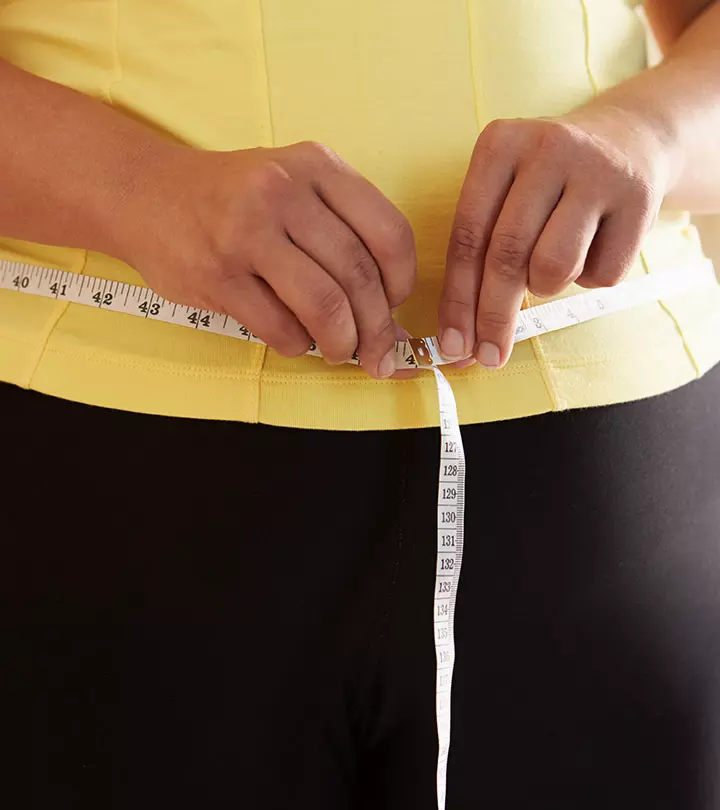

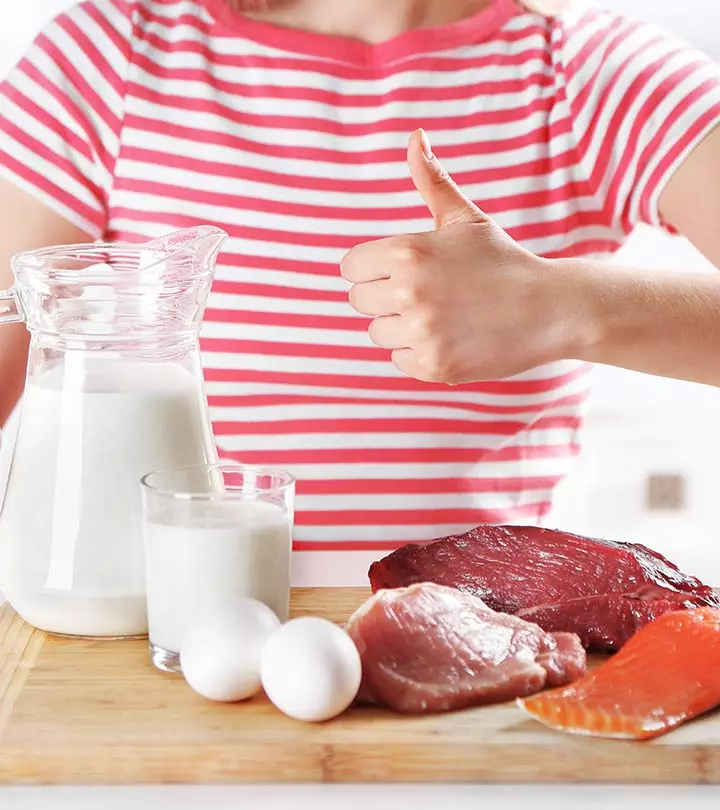
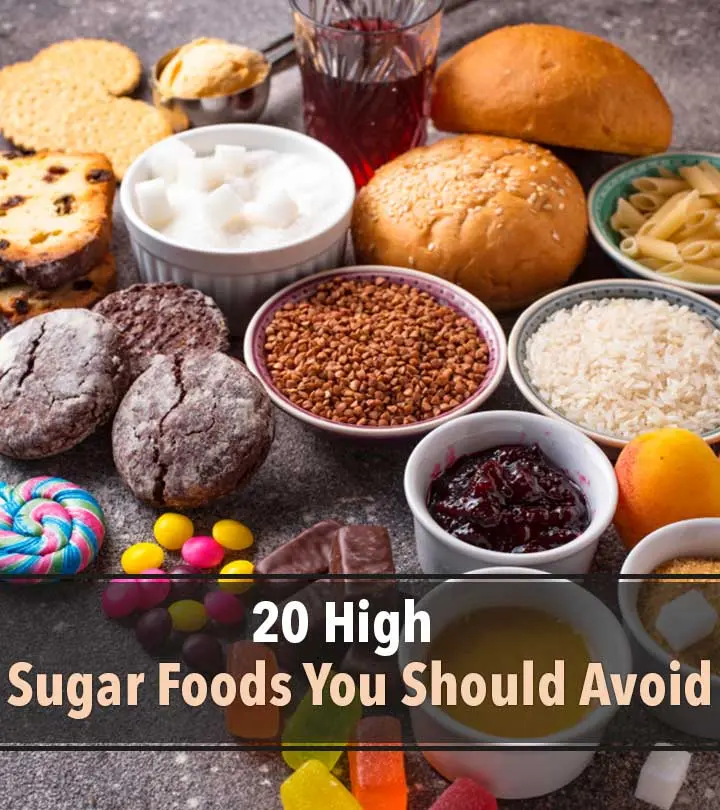

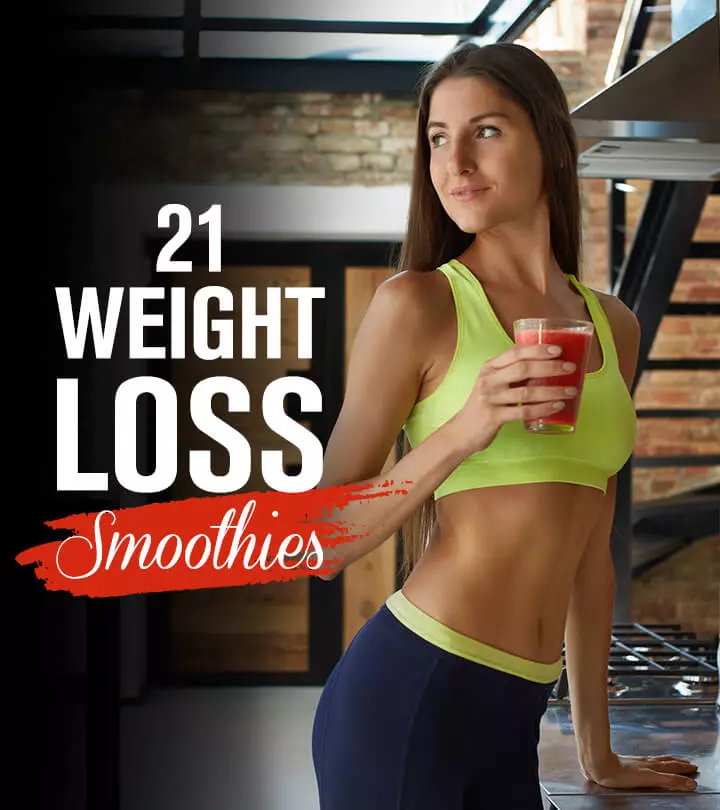



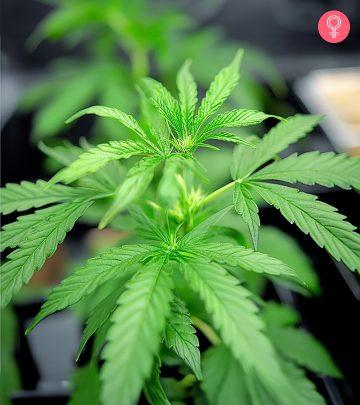
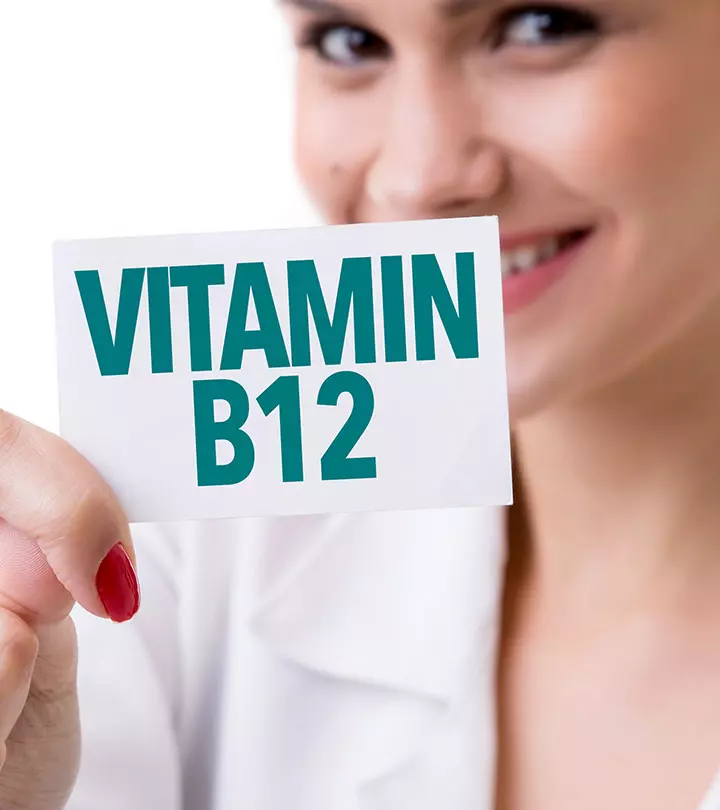



Community Experiences
Join the conversation and become a part of our empowering community! Share your stories, experiences, and insights to connect with other beauty, lifestyle, and health enthusiasts.